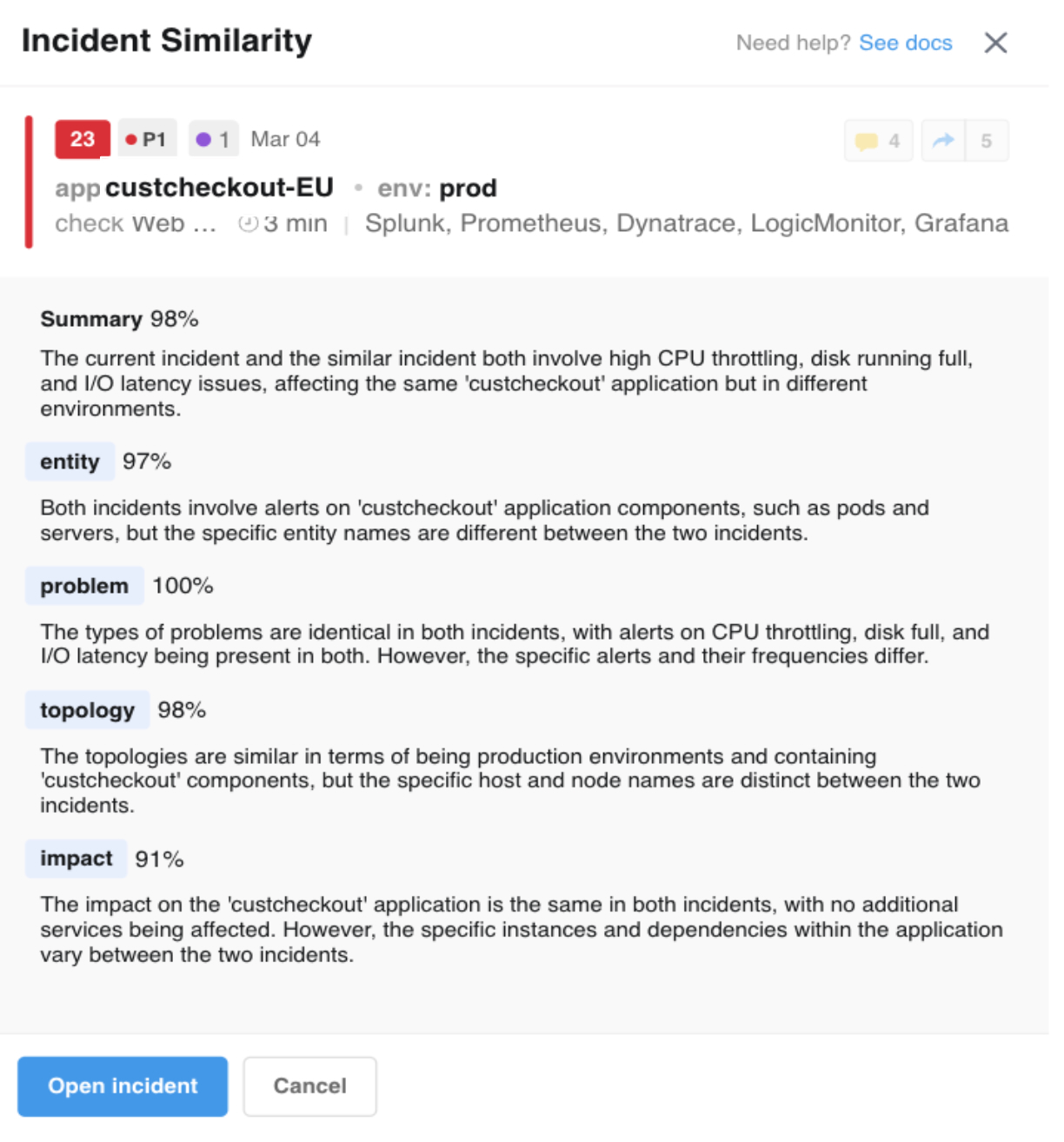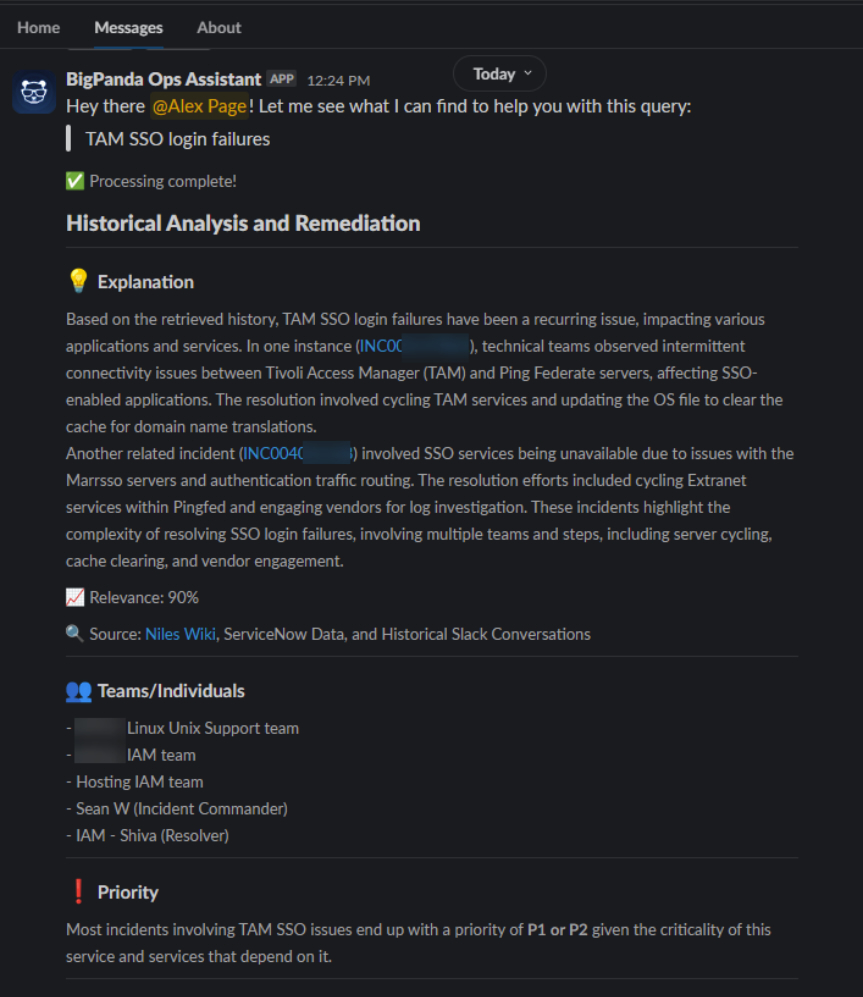Partner POV | BigPanda delivers full context for faster, scalable AIOps
In this article
Article written by Katie Petrillo, Senior Director - Product Marketing, BigPanda.
BigPanda is proud to announce new features and capabilities that enable you to leverage historical incident records and institutional knowledge. These advancements make powerful incident context available to everyone who needs to deliver high-quality IT services.
The importance of context in IT operations management
Incident-related context often exists only in the memories of subject-matter experts. Or it's buried deep in knowledge base articles, runbooks, and standard operating procedures (SOPs). Finding information can be time-consuming and imperfect, if not frustrating or even impossible. One-third of ITOps leaders report that the lack of business context and understanding of the impact is the biggest challenge to incident response and management, according to recent Enterprise Management Associates (EMA) research.
Context is critical to success. Full-context operations combine observability and other machine-generated data with historical, expert, and institutional knowledge. Our customers tell us that having full incident context allows them to:
- Eliminate operational silos between teams
- Quickly access the data they need to act quickly
- Reduce unnecessary escalations and re-escalations
- Maintain the availability of critical systems more efficiently
Detail is critical and time is money. Alert and incident context provide a bridge between uptime and downtime. The average outage costs $14,056 every minute, up from $12,900 in 2022, according to EMA's 2024 research on outage costs. Context gives ITOps and ITSM teams the information they need from the start to activate incident response. With it, they can move faster, avoid surprises, and establish expertise quickly.
Access historical context with Similar Incidents
Today, we announce the availability of Similar Incidents, a new capability that helps you achieve full-context operations. Until now, BigPanda has primarily centralized data from observability, topology, change, and CMDB tools. However, legacy knowledge from past incidents is critical to resolve current and future incidents.
Similar Incidents gives responders immediate access to the prioritization of prior incidents, who was involved in the remediation, and the steps to resolve the issue. By providing historical context at the very start of the incident lifecycle, BigPanda helps speed up resolution and enables self-service incident management. The context provided in Similar Incidents also dramatically reduces the need for massive bridge calls and repeat ticket escalation, lowering MTTR and increasing team efficiency.

Similar Incidents scores similarity based on the entity, problem, topology, and impact of past incidents. It focuses on details including the priority, impact, teams involved, and resolution steps. Crucially, Similar Incidents works in conjunction with other BigPanda capabilities to:
- Reveal all correlated alerts
- Build a dynamic topology of related systems
- Identify probable root causes
- Provide AI-powered insights within the BigPanda Advanced Insight module
These critical details eliminate tedious triage, significantly reducing MTTR.
Reveal hidden knowledge with an AI-powered co-pilot
Today, we also announce an early-access program for a powerful new tool. We built the BigPanda AI-powered co-pilot to help teams find, understand, and act on historical, expert, and institutional knowledge. Codenamed Biggy, the co-pilot uses machine-generated and historical data — and is the first to leverage human-generated, institutional knowledge for AI-powered incident response.
This broad spectrum of knowledge aggregated in the BigPanda Unified Data Fabric allows Biggy to deliver automatic, dynamic, and actionable insights to ITOps and ITSM teams as they investigate and respond to live incidents.
Far more than just a natural language interface, Biggy serves as:
- A central hub for all knowledge and data across the IT environment. The co-pilot incorporates historical ITSM incident and collaboration data as well as knowledge base articles, runbooks, SOPs, and more.
- An AI-powered recommendation assistant. Users interact naturally with Biggy, ask it questions, and receive explainable, real-time recommendations on resolving incidents, even as they rapidly evolve.
- Access to previously inaccessible information. Teams can access contextual data in collaboration tools like Slack and Microsoft Teams, the BigPanda console, and ticketing tools.

The BigPanda AI engine powers Biggy, allowing it to sift through vast amounts of data, identify the most relevant, and display it as real-time context-aware insights at the point of use. Biggy is available right within the collaboration tools your teams already use. This integration provides it with awareness of real-time activity and knowledge, allowing it to evolve its output as the incident evolves. As a result, Biggy empowers teams to deliver the highest quality digital services with increased speed and efficiency.
Biggy is currently a prototype in beta. Contact your account team if you're interested in applying to join the early-access program. Learn more about Biggy in "AI-driven contextual mastery for incident response."
Maximize your ServiceNow deployment
Now, when you integrate BigPanda with ServiceNow, ITOps and ITSM teams can access insights directly in every ITSM ticket, including root cause, impact, and priority. Part of the Advanced Insight module, this new integration enables self-service incident management and reduces the reliance on war rooms, crowded bridge calls, and repeat ticket escalations.
Our latest ServiceNow integration allows teams to send ITSM incident data to BigPanda automatically. The combination of historical, actioned ITSM data with real-time incident data gives ITOps and ITSM insights on critical efficiency and service availability metrics for the first time, such as major incident volume, MTTR, FTE hours, and cost savings. The integration simplifies the ability of teams to measure and share the business value of AIOps on service availability and SLAs with executives and stakeholders.
Control sharing of incident data in your ops stack
Customizing how and when you share information in external tools. The new custom autoshare delay feature allows administrators to apply rules that manage the timing of ticket creation or incident-related communications until an incident meets certain conditions.
For example, if alerts from a particular application typically resolve automatically within 10 minutes, you can hold ticket generation for the alert type until it exceeds the 10-minute threshold, indicating unusual behavior. This helps you avoid paging employees for tickets that resolve automatically minutes later. BigPanda context-driven automation reduces false positive tickets, allowing teams to focus on the highest-priority incidents and eliminating frustration.
Jump-start full context ops
BigPanda AIOps unifies data, tools, and processes across observability, operations, and ITSM teams, providing the full context of every incident — up front, quickly, and consistently. With better information, you can remediate incidents at scale, improve operator efficiency, and increase application and service availability.